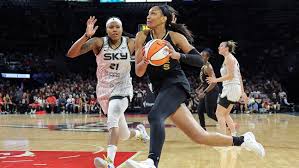The Women’s National Basketball Association (WNBA) Founded on April 24, 1996, as the counterpart to the National Basketball Association (NBA), the WNBA has grown into a significant force in the sports world, promoting gender equality and providing a platform for some of the most talented female athletes in the world. The league has faced numerous challenges throughout its history, including issues related to visibility, revenue, and gender bias, but it has also achieved tremendous success in advancing women’s sports and inspiring future generations.
Table of Contents
Formation and Early Years

The WNBA was founded during a time when there was growing interest in women’s sports, particularly after the success of the 1996 Olympic Games in Atlanta, where the U.S. women’s basketball team won the gold medal. This success, combined with the growing momentum for gender equality in sports, led the NBA to establish a women’s league. The inaugural WNBA season began in June 1997 with eight teams: the Charlotte Sting, Cleveland Rockers, Houston Comets, Los Angeles Sparks, New York Liberty, Phoenix Mercury, Sacramento Monarchs, and Utah Starzz.
In its early years, the WNBA was dominated by the Houston Comets, led by legends such as Cynthia Cooper, Sheryl Swoopes, and Tina Thompson. The Comets won the first four WNBA championships from 1997 to 2000, establishing themselves as a dynasty and setting a high standard for excellence in the league. Despite the success of the Comets and other teams, the league faced challenges in terms of attracting viewership and sponsorship, as it competed for attention in a male-dominated sports landscape.
Growth and Development

As the WNBA entered the 2000s, it began to expand and gain more recognition. New teams were added, including the Minnesota Lynx, Seattle Storm, and Connecticut Sun, bringing the total number of franchises to 16 at its peak. The league also saw an influx of international talent, with players from countries such as Australia, Brazil, and Russia joining the WNBA and adding to the diversity and competitiveness of the league.
The league’s growth was also marked by the emergence of new stars who became household names. Players like Lisa Leslie, Sue Bird, Diana Taurasi, and Tamika Catchings helped to elevate the WNBA’s profile and brought attention to the high level of skill and athleticism in the women’s game. Leslie, in particular, made history in 2002 when she became the first player to dunk in a WNBA game, a moment that symbolized the increasing athleticism and excitement in women’s basketball.
Challenges and Resilience
Despite its growth, the WNBA has faced significant challenges, particularly in terms of financial sustainability and media coverage. The league has historically struggled with lower attendance and television ratings compared to men’s sports, leading to concerns about its long-term viability. Many teams have faced financial difficulties, leading to relocations, contractions, and even the folding of some franchises, such as the Houston Comets in 2008.

Gender bias has also been a persistent issue, with female athletes often receiving less recognition, lower salaries, and fewer endorsement opportunities than their male counterparts. The WNBA has fought against these disparities, advocating for better pay, improved working conditions, and greater respect for women in sports. In 2020, the league and its players’ union reached a landmark collective bargaining agreement that included significant salary increases, enhanced maternity benefits, and better travel accommodations, reflecting the players’ growing influence and the league’s commitment to progress.
Social Impact and Advocacy
The WNBA has been at the forefront of social justice and advocacy efforts, often taking a leading role in addressing issues such as racial inequality, gender discrimination, and LGBTQ+ rights. The league and its players have used their platform to speak out on important social issues, demonstrating a strong commitment to activism.
In 2020, the WNBA played a pivotal role in the Black Lives Matter movement, with players dedicating the season to social justice initiatives and honoring Breonna Taylor, a Black woman killed by police in Louisville, Kentucky. The league’s activism extended beyond the court, as players like Maya Moore took significant steps to address racial injustice, with Moore even stepping away from basketball at the peak of her career to work on criminal justice reform.
The WNBA’s commitment to social issues has not only earned it respect but has also helped to broaden its appeal, attracting fans who are passionate about social justice and equality. The league’s progressive stance has positioned it as a leader in sports activism, setting an example for other leagues to follow.
Recent Developments and Future Prospects
In recent years, the WNBA has continued to grow in popularity and influence. The league has seen increased media coverage, larger television contracts, and a growing fan base. The 2020 WNBA Draft, held virtually due to the COVID-19 pandemic, was one of the most-watched drafts in league history, highlighting the rising interest in women’s basketball.
The league’s partnership with major companies like Nike, ESPN, and Twitter has also helped to boost its visibility and marketability.
Looking ahead, the WNBA’s future appears bright. The league is poised to continue its growth, with plans for expansion, increased investment, and continued advocacy for gender equality in sports. The success of recent stars like Breanna Stewart, A’ja Wilson, and Sabrina Ionescu, along with the enduring legacies of veterans like Sue Bird and Diana Taurasi, ensures that the WNBA will remain a significant force in the world of sports.
indianfastearning.comWNBA star Dearica Hamby sues the league and her former team for discrimination 2024 wonderful
Conclusion
The WNBA, through its 25-plus years of existence, has proven to be more than just a sports league. It has become a symbol of perseverance, advocacy, and excellence in women’s sports. Despite the challenges it has faced, the league has continued to grow, inspiring countless young athletes and making a lasting impact on society. As it looks to the future, the WNBA will undoubtedly continue to play a crucial role in the ongoing fight for gender equality and social justice, both on and off the court.
www.youtube.comhttp://WNBA







